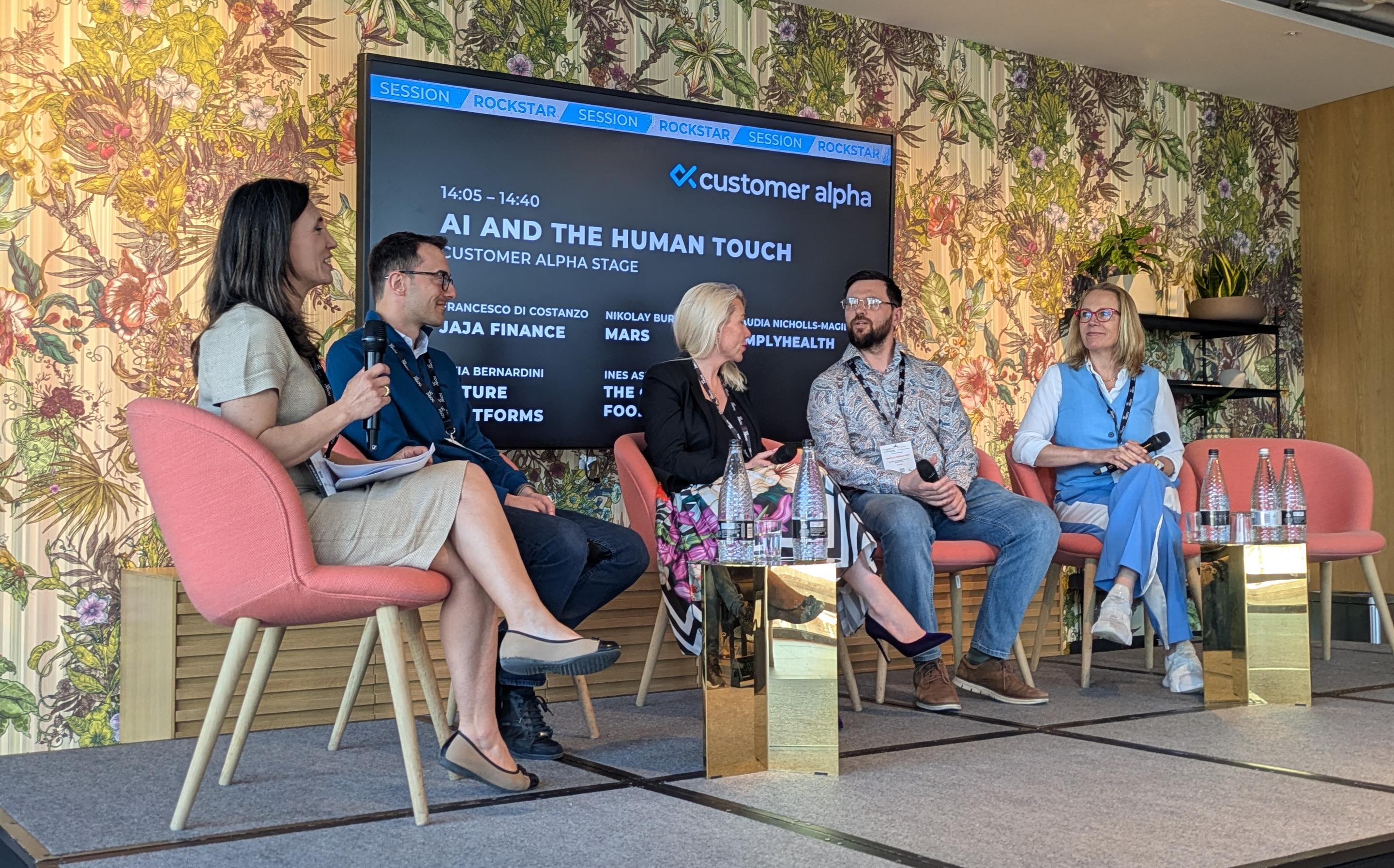5 Key Trends in AI & Customer Experience in 2025

Artificial Intelligence (AI) continues to be one of the most fascinating and fast moving areas of innovation in customer experience (CX). It promises to enhance service delivery, personalise interactions, and drive efficiency. Yet as businesses scale their digital transformation efforts, one truth remains clear: the real challenge is balancing technological advancement with human connection.
That was exactly the focus of the session I had the pleasure of moderating at Customer Alpha 2025, held on 13 May in London. The session, titled "AI and the Human Touch", featured four remarkable speakers:
We explored how AI is no longer just a technical enabler. It is becoming an agent of empathy, purpose, and trust. The final question from the audience captured this perfectly: Will we end up marrying AI? And without hesitation, the panel's consensus was a confident and thought provoking yes.
Not because machines will replace relationships, but because AI is becoming so deeply embedded in our lives that emotional intelligence, trust, and relevance are now core to how we build, deploy, and experience it.
Here are five key trends in AI and CX for 2025, enriched with insight straight from the panel.
1. AI Powered Customer Service is All About Speed and Smart Escalation
Francesco Di Costanzo, CEO at JaJa Finance, shared how their chatbot, trained on extensive Q&A data, is now resolving 50 percent of queries in under 16 seconds. In comparison, a human agent would typically take 3 minutes. The system not only improves efficiency but frees up human agents to focus on more complex, sensitive cases. The secret? Training the AI to maintain a consistent, empathetic tone, and knowing exactly when to escalate.
2. Holistic ROI is the New Standard
Ines Ashton, Digital and AI Strategy Director at The Compleat Food Group, challenged the room to rethink how we measure the success of AI. ROI, she argued, should include not just financial returns, but sustainability impacts, including the carbon cost of data centres and compute usage. Her point was clear: smart AI is efficient, but truly responsible AI is efficient and conscious.
3. AI That Serves Purpose is AI That Sticks
Claudia Nicholls, Chief Customer Officer at SimplyHealth, shared how their approach to AI was deeply anchored in purpose. AI has allowed them to extend access to 24/7 healthcare support, reach more customers, and reduce costs, but only because every use case was tied back to the company's mission to increase healthcare access in the UK. Purpose was the filter that shaped their roadmap.
4. Emotionally Intelligent AI is No Longer a Luxury
According to recent data from Harvard Business Review, the number one use case for GenAI in 2025 is no longer content creation. It is therapy and companionship. We are witnessing a shift from AI as a productivity tool to AI as an emotional assistant. From voice models that replicate human sighs and laughter to mental wellness tools that adapt in real time, this is about more than tech. It is about trust and emotional literacy at scale.
Nickolay Burlutskiy from Mars shared reflections on how their GenAI transformation is helping bring consistency and quality across markets, and how emotionally intelligent systems are becoming a must for global brands operating at scale.
5. Search is Being Redefined: Relevance is the New Speed
One key shift across industries is the rise of AI powered search trained on proprietary data. Forget FAQs. Customers expect search to be contextual, personalised, and instant. As I said on stage, we are entering a world where typing "Where's my stuff?" should return your specific order status, not a generic help article. This is not just about speed. It is about relevance. Search that feels built just for you.
In Closing
The future of CX will not be defined by tools alone, but by the choices we make in how we design them. Empathy, purpose, and trust are not soft edges. They are the core differentiators in how we build AI that truly works for people.
And if the last question of our session is anything to go by, "Will we end up marrying AI?" the answer is already taking shape. We are not building tools. We are building relationships.
If you're ready to elevate your customer experience with AI, book a call with our team today.
Insights

5 Kickass Brand Loyalty Examples

The 5 Core Principles of Building a World-Class Transport App

Successful Strategies for Boosting Digital Loyalty

Planning for 2025: Why Loyalty Solutions Should Be Top of the Agenda

COVID-19 and Retail: How Digital can Save your Store

